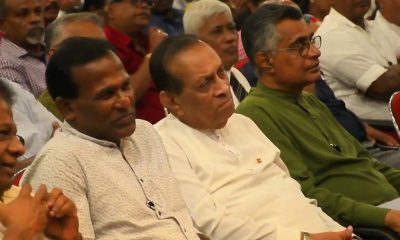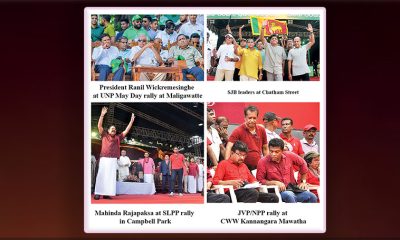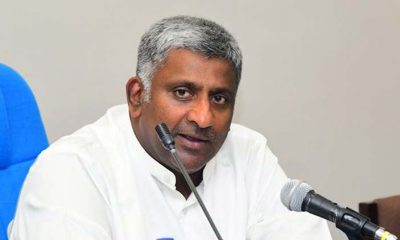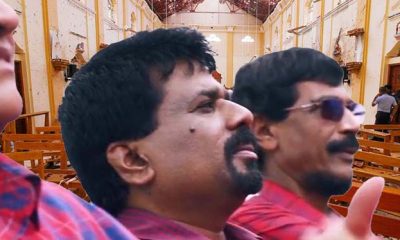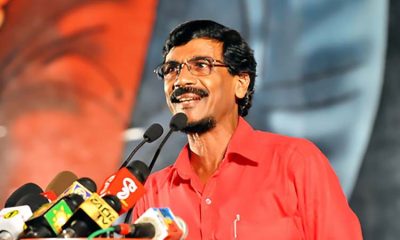Opinion
Whither JVP? – A Reply
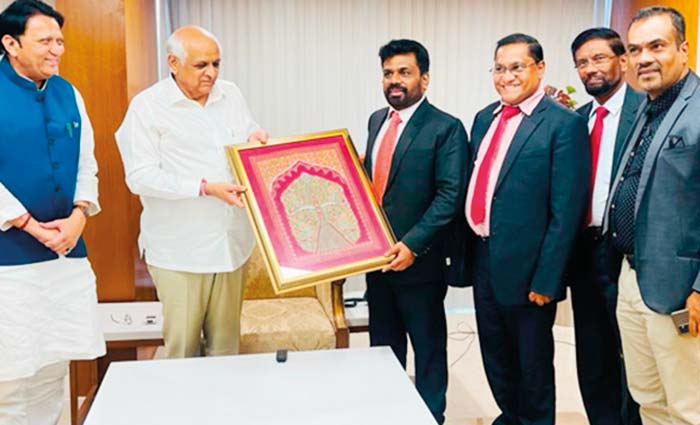
I am very grateful to The Island editor for allocating some space for me in his highly readable newspaper. It’s the paper I read 24/365 first thing in the morning. (Thee Sunday Island on Sundays). Not given to abusing kindness, I shall not waste time and space on trifling matters, trying to explain to retired Dr Upul Wijayawardhana (UW) who or what “nabob” is.
UW says he found it difficult to “comprehend” what I meant in my piece “AKD’s visit to India,” except that I was attacking naybobs. The rest had been too much for his intellect.
I referred to the horrific wars that were waged – World War I and World War II – in which millions of lives were lost, in fact more than twice the entire population of Sri Lanka. The US nuked Japan, the one and only country to be attacked with nuclear weapons. Yet today, they are great friends. There is no more enmity between the Allies (the US, the UK and France) and the Axis powers (Germany and Japan.) They were ready to put the past behind them and look forward to the future for the sake of their countries and their people and move forward together. That is why these are the most developed and wealthiest countries today.
They even helped China to rise as an economic power even though China was a Communist country then in league with Communist Russia. They were the new enemies of the capitalist west; but that did not deter the west from extending a hand to develop especially China’s economy by transferring technology. As a result, China is the second strongest economic power today. I cannot believe thought leaders of the west did not know this would be a strong possibility when they set off to help China.
These great developments which have benefited all of humanity whatever the country, would not be real today if they had to wait for apologies. Does UW apologise each time one of his patients dies? Or, did he cure all the patients who came to him without exception? If some died and he did not apologise, would he accept the epithet that he is a no good surgeon?
Closer home, India was with Russia once; and Pakistan pro-US. But they have changed places today: India is with the US and Pakistan is no more with the US but more aligned with China. This is how the macro picture is changing in a dynamic world. No apologies for changing partners.
Sadly, UW fails to see the bright side of AKD’s India visit; its positive side for Sri Lanka’s future and the future of the Sri Lankan people battered, bruised and killed by all parties even though UW can see only the killings of one party. Unable to bear the pain, he migrated to the UK forsaking the people he claims to love so much. He would prefer wounds to remain in his own beloved country, and wittingly or unwittingly, open the door once again to those who plundered the country to come back and continue plundering. Among them is the party of his uncle whom he misses very much; killed as he says, by the JVP. The tone and tenor of his writings betray who the beneficiary is of his writings.
He says more than 60,000 were killed and implies the JVP is responsible for all of them. He is silent about the killings by the UNP and the party of his beloved uncle. Are they also included in the 60,000? If not, why doesn’t he give those figures also to show his writings are fair and balanced; and not biased?
If thinking such as UW’s prevails, Sri Lanka will never be able to learn from the mistakes made during the past 76 years and start anew to rebuild her economy and a better future for its people.
Please note: The main issue I have dealt with here is AKD’s visit to India and its potential benefits to Sri Lanka, thinking positive. As for the reasons why AKD has not acceded to the demand for an apology so far, I am unable to reply, not being a politbureau member nor even an ordinary member of the JVP or NPP.
Brigadier Ranjan de Silva
rpcdesilva@gmail.com
Opinion
Prof. Harshana Sasanka Rambukwella: A Charismatic Pedagogue
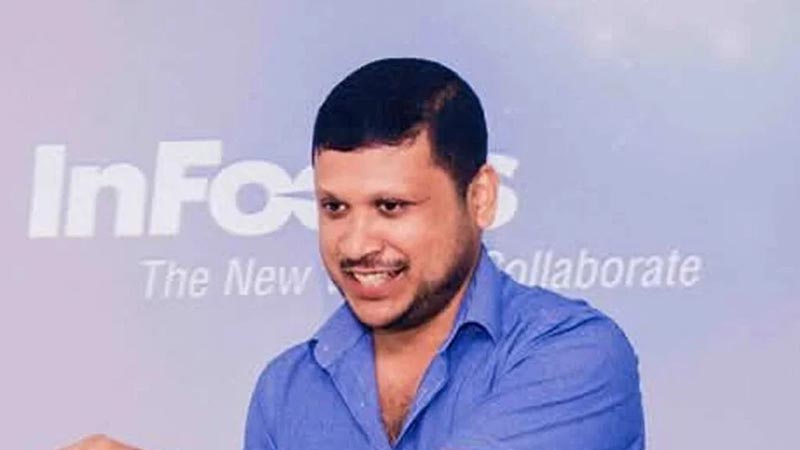
Yesterday, a sumptuous rainbow manifested over Pera. I could not but think of you, my friend!
Harshana was my batchmate at Pera in 1997.
Since he was the only boy among a bevy of girls, taking the first year English course offered by the English Department, Professor Erskine called him the “thorn among roses” at the very first lecture we had with him. But Harshana Sasanka Rambukwella was never a thorn in anyone’s side, so the name did not stick.
He was a lovely human who was happy to spread goodwill among all he associated with. What I remember most distinctly about him is that he was level-headed even as a raw fresher and could argue a point with strength without showing an ounce of unnecessary aggression. Though he had a temper it was reserved for what called for anger.
My most distinct memory of him is when he and I went to the E.F.C. Ludowyk memorial lecture, when Dr. Jayantha Dhanapala spoke on Neruda, as a poet and diplomat. We were awe -struck and though shy as freshers enjoyed the academic atmosphere and the sophistication Dr. Dhanapala exuded. I am glad we did not know of Neruda’s darker side then. That would have spoilt the experience.
I also remember that we chortled when Professor Walter Perera told us not to partake of the refreshments, sotto voce because he had not thought that many people would show up. Then later, good old “Wally,” told us to go on and tuck in because there was enough to go around, with very visible relief. The two of us laughed and chuckled all the way home.
Those were good times.
I was reminded of his temper when I met him as my Professor in my Sociology of Education class, which he taught with Professor Harini Amarasuriya. It was one of the most enjoyable sessions that I was fortunate enough to attend. He would speak on Pierre Bourdieu with such magnanimous expertise helping even the most reluctant of students understand the depth of the French sociologist and philosopher’s views on education and other matters, relating these theories as they should be adopted in the teaching of English in Sri Lanka. When students in his zoom meetings were quiet, he would say with severity, ” the level of engagement is very low.”
The Charismatic Pedagogue was the title on one of his kuppi talks contributions. He was indeed a charismatic Pedagogue.
When he brought up the notion of the Brown Sahib and Thomas Macaulay, I could not help but feel nostalgic, reminded of the time we had spent as raw freshers at Pera. There was Ramila, who remained his best friend until he passed away and of course Prashani and many others. There was nothing very raw about Harshana. He was always a gentleman whether as a young man or as the gentleman I met last on 6th August 2022, when I first visited the PGIE. He would always check my availability when he called me later on and I would say “What men! Don’t stand on ceremony just call anytime!”
It was pure irony that he was one of the judges at a competition and when my entry which went without my name won, his happiness on my success was very evident when he called to congratulate me.
As a scholar, Professor Rambukwella has made many notable contributions both as the director of PGIE and also through his quite prolific writing and research which include research papers such as , Anagarika Dharmapala: the nation and its place in the world, Patriotic Science–The Corona Virus Pandemic, Nationalism, and Indigeneity, and the countless papers he co-authored with the best in the field, and his explorations on Sri Lankan English and last but not least his magnum opus: ‘The Politics and Poetics of Authenticity: A Cultural Genealogy of Sinhala Nationalism.’ This work translated by his good friend Professor Wasantha A. Liyanage, “Amare,” will influence the Sri Lankan reader for time to come. It was a timely and necessary work which will in future help countless students, scholars and readers make sense of the dialogue surrounding the notion of Sri Lankan Nationalism as manifest in politics and literature and Sri Lankan culture. He was not simply an academic he was a man of taste who lived and loved and partook of culture.
Harshana’s life, though brief made its mark on the world because he was not simply an idealist, he was an activist and a trade unionist. He led by example and was a mentor to countless people, students, writer and scholars and a miscellany of others who defy labelling. This must be a trait that he inherited from his father, who was a mild gentleman when we met him during his stint at the English Teaching Unit, but had a reputation as one of the best teachers and school masters Dharmaraja College, Kandy could boast of.
Harshana was a great scholar, a teacher par excellence and a warm kind hearted human being. He will be missed, not only by Prashani, and the two lovely girls about whom I have heard so much, but by everyone who knew him however briefly.
Rest easy my friend! You will be loved. Your life though brief is a cause for celebration not for lament!
By Ashanthi Ekanayake
Opinion
Ragging and loss of life

Recently another life of an undergraduate was lost due to barbaric ragging at the Sabaragamuwa University. This is not the first time this happened at this University and sometime back a girl committed suicide due to inhumane ragging. It is pertinent to examine some of the factors as to why this sort of inhumane ragging goes on unabated in the universities. The most important factor as to why ragging cannot be stopped falls on the university administration. Vice Chancellors are mortally scared of these violent student groups backed by their unions to take punitive action against the perpetrators of this violence. This may be because they want to paint a picture of a peaceful atmosphere in the universities to their political masters who appointed them in the first place. These vice Chancellors are also aware of instances where strong action taken against ragging by Vice Chancellors in the past resulted in their removal such as Prof. Epitawatte at Sri Jayewardenepura and Prof, Sujeewa Amarasena at the Ruhuna University. They desist from taking action with the students because of the fear that the students will organiSe protests and even resort to physical violence against them. Academic staff members also turn a blind eye even when they see instances where ragging is openly carried out by the seniors. This may be because they themselves were raggers in the past and see nothing harmful in such sordid instances of ragging. Unlike in the past, ragging today is inhuman, violating privacy and forcing hapless undergraduates into the worst forms of human torture.
Ragging is most prevalent in halls of residence where the wardens and sub wardens simply turn the other way and never try to stop this menace. Wardens are collecting points for their next promotion and do not see that it is their duty to look after the welfare of the students.
Police, too, are to be blamed for not taking action against raggers under the Anti-ragging Act even after the university produces these culprits at the police station. I can well remember the case of a ragging incident at the Peradeniya University, where the accused were handed over to the police and they wanted to record it as a case of two student groups involved in a fight. Some time ago, the Police Department stated that all forms of ragging should be reported to the CID but nothing happened under this arrangement. Similarly, recently the Attorney General gave an undertaking to the supreme court that the vice chancellors have been instructed to prevent ragging in the universities but this is just restricted to actions on paper and nothing substantial has come out. Similarly, the Attorney General’s department takes years to prosecute raggers who have been caught, produced before judges and released on bail. There is a case of some agriculture faculty students who were caught red handed in a safe house outside the University premises at Peradeniya several years ago. The Attorney General has still not filed action against these students.
This year 1250 students have been selected to the Faculty of Arts at the Peradeniya University, where there are only150 males including 30-Buddhist monks. This shows that males shy away from attending a state university and think that it is better for them to go to a private university where there is no ragging. In fact, private universities have more males than females and the underlying reason is the lack of ragging in these private universities.
The political parties who back the student unions cry hoarse for preserving free education but they do not have the slightest idea that these ragging incidents are a big threat to free education. It is up to the Government to set up effective mechanisms to curb ragging including strict instructions to the police and the legal system to deal with these cases under the anti-ragging act.
by Professor O. A. Ileperuma,
Emeritus Professor, University of Peradeniya
Opinion
Remembering Dr. Samuel Mathew: A Heart that Healed Countless Lives
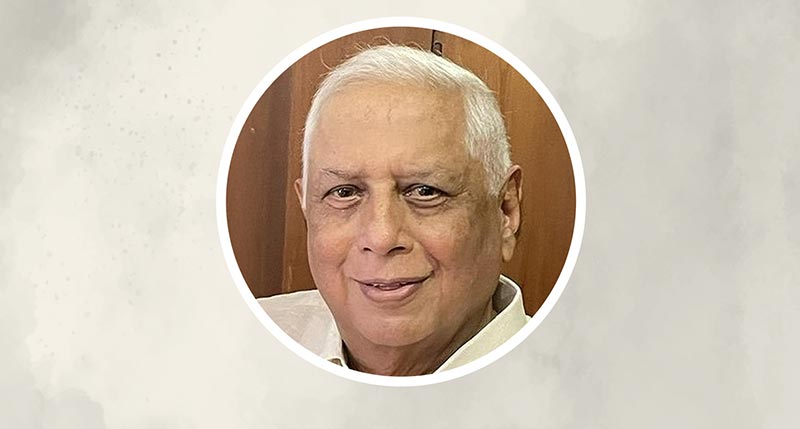
It is with a deeply heavy heart that I express my sincere condolences on the passing of Dr. Samuel Mathew Kalarickal on the 20th of April 2024. Born in 1948, Dr. Samuel was not only a pioneer of interventional cardiology in India but a giant in South Asian healthcare whose influence extended far beyond national borders.
A Beacon of Excellence and Compassion
Known as the “Father of Angioplasty” in India, Dr. Samuel introduced life-saving coronary interventions when they were still rare. His leadership at Apollo Hospitals and Kokilaben Dhirubhai Ambani Hospital brought cardiac care to global standards. But beyond the accolades, it was his humility, compassion, and unwavering dedication to patients that truly set him apart.
A Lasting Impact on Sri Lanka
Dr. Samuel played a pivotal role in shaping modern cardiac care in Sri Lanka. In the 1990s and early 2000s, many Sri Lankan patients sought his expertise in India, trusting him with their lives. He treated them with care and dignity, leaving lasting impressions on families across the island.
He also trained and mentored numerous Sri Lankan cardiologists, generously sharing knowledge of advanced procedures and technologies. His efforts helped uplift cardiac care back home and empowered many of us to bring those skills to our own communities.
A Mentor Who Lit the Path
To me, Dr. Samuel was more than a mentor—he was a fatherly figure. I fondly recall our time at the 2011 Coimbatore meeting, where he urged me to form the Sri Lanka STEMI Forum. His guidance helped us create national strategies and treatment models for heart attack care—an initiative that continues to save lives today.
A Legacy That Lives On
Dr. Samuel leaves behind more than medical breakthroughs. He leaves behind a legacy of service, inspiration, and heart. His memory will live on in every life he touched, every doctor he guided, and every patient he healed.
You will be remembered always, Sir—not just for what you did, but for who you were.
May your soul find eternal peace.
– Dr Gotabhaya Ranasinghe
-

 News6 days ago
News6 days agoJapan-funded anti-corruption project launched again
-

 Sports5 days ago
Sports5 days agoOTRFU Beach Tag Rugby Carnival on 24th May at Port City Colombo
-

 News6 days ago
News6 days agoSethmi Premadasa youngest Sri Lankan to perform at world-renowned Musikverein in Vienna
-

 News3 days ago
News3 days agoRanil’s Chief Security Officer transferred to KKS
-

 Business6 days ago
Business6 days agoNational Savings Bank appoints Ajith Akmeemana,Chief Financial Officer
-

 Features4 days ago
Features4 days agoThe Broken Promise of the Lankan Cinema: Asoka & Swarna’s Thrilling-Melodrama – Part IV
-

 Features5 days ago
Features5 days agoTrump tariffs and their effect on world trade and economy with particular
-
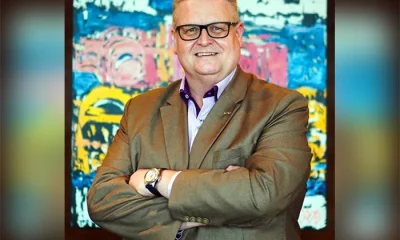
 News4 days ago
News4 days agoRadisson Blu Hotel, Galadari Colombo appoints Marko Janssen as General Manager





